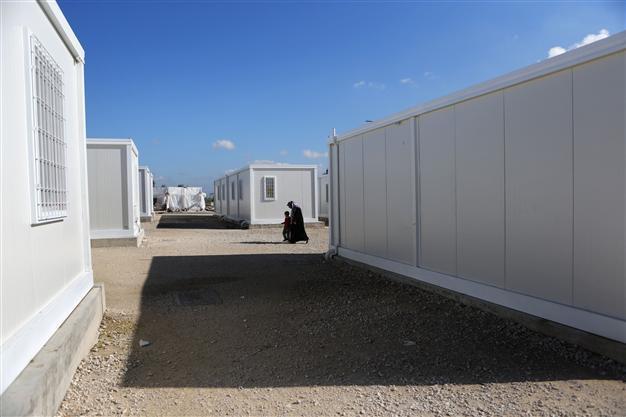Syrian refugees plot Greek Cyprus escape as camp closes
KOKKINOTRIMITHIA - Agence France-Presse

A Syrian refugee and her son walk past buildings in the Kokkinotrimithia refugee camp in Greek Cyprus on January 20, 2015. AFP Photo
It costs thousands of euros for a false passport and place on a boat to Turkey, but Syrian refugees stranded in Greek Cyprus are ready to try anything.After already paying thousands last year to take a boat from Syria that was abandoned by smugglers at sea, many of the 345 refugees who were rescued and bought to Greek Cyprus are already planning another treacherous voyage.
"There aren't the advantages (in Greek Cyprus) that there are for refugees in other European countries," says Salwa, who left her two young boys behind in Syria to flee on the boat with her daughter.
"I can't bring my children, so it's completely impossible for me to stay here," Salwa, not her real name, tells AFP from inside her tent at a temporary camp west of Nicosia.
Most of the refugees, who spent several days and nights adrift in the Mediterranean before being rescued in September, had hoped to reach the Netherlands, Germany or Sweden.
Instead, they have lived in Kokkinotrimithia camp for close to three months, with Greek Cypriot authorities providing their security, food and medical care.
But last week the civil defence forces packed up and left along with the doctors.
The camp is set to close at the end of the month, according to the authorities, who want the Syrians to apply for permanent asylum in Greek Cyprus.
This is not what the refugees have in mind, however, with most days in camp spent plotting their escape from the island -- by any means available.
Bassam, a 25-year-old teacher, bought a counterfeit passport from a smuggler in Turkish Cyprus.
He was arrested by Turkish Cypriot police before he could leave the island and returned to Kokkinotrimithia.
Eighteen-year-old Salma -- not her real name -- arrived on the boat with her mother, who suffers from cancer. Her brother, an engineering student, and her sister, a doctor, were also aboard.
After weeks spent in a tent in the camp, they decided to escape using false passports, paying 1,500 euros ($1,700) each for the documents.
They managed to leave the island and reach Istanbul, where Turkish police arrested them attempting to board a plane to Denmark. The family was sent back to the camp.
According to data released by the UN's refugee agency in July, just four percent of the more than three million Syrians who have fled the war were given refugee status in Europe.
The situation in Greek Cyprus is even less encouraging, with just one Syrian receiving refugee status there in 2013, according to the European Council on Refugees and Exiles.
Although the Syrians on Salwa's boat could receive another form of limited, or "subsidiary" protection, many are loath to do so as receiving official status in Greek Cyprus could prevent them from joining up with family in other European countries.
Now, with the police gone, smugglers flock to the camp every day, refugees tell the Red Cross.
"We tried all the embassies to try and leave here in a legal manner," says Salwa.
"We have paid millions (of Syrian pounds) to go to another European country. Now, people are profiting from our weakness, our situation, to get more money from us by promising to take us somewhere else," she adds.
"We are ruined."
Abd el-Latif also attempted to flee Cyprus.
"Once in Turkey, the plan was to get a boat straight away to Europe," he says.
He trawled the streets of Nicosia looking for a smuggler who would take him across the water to the southern Turkish port of Mersin.
After finding someone willing to make the trip and agreeing terms, Abd el-Latif tried to cross the line dividing Greek Cyprus from the north, where he was arrested.
Word spreads among the tents that 15 refugees managed to leave Greek Cyprus on Monday. Each had paid 1,000 euros to get to Turkey, according to Salma, a mixture of weariness and anger on her face.
"Honestly, we didn't think that a European country would treat us like this," she says. "Why would they have saved us if they wanted us to die here?"
















